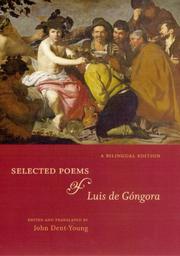| Listing 1 - 3 of 3 |
Sort by
|

ISBN: 1281959510 9786611959517 0226140628 9780226140629 0226140598 9780226140599 022637887X Year: 2007 Publisher: Chicago University of Chicago Press
Abstract | Keywords | Export | Availability | Bookmark
 Loading...
Loading...Choose an application
- Reference Manager
- EndNote
- RefWorks (Direct export to RefWorks)
Known as the "Spanish Homer," Luis de Góngora y Argote (1561-1627) is widely considered to be Spain's greatest poet. He was both praised and vilified during his lifetime, but his reputation waned in the years after his death; in the 1920's, he was championed by the Modernists, including Federico García Lorca, and influential critics of Spanish literature, including Dámaso Alonso. Famous for intricate metaphors in baroque style and syntax, Góngora has even been immortalized as a literary term: a "gongorism" connotes an involved Latinate style. Yet despite his influence and reputation
POETRY / General. --- Góngora y Argote, Luis de, --- Góngora, Luis de, --- Argote, Luis de Góngora, --- poetry, translation, world literature, spain, spanish, puns, innuendo, sexuality, romance, passion, erotics, sonnets, songs, ballads, fable of polyphemus and galatea, letrillas, pyramus thisbe, first solitude, soledad i, poetics, creative writing, mythology, intertextuality, adaptation, folklore, canon, love, mourning, religion, classicism, nativity, el greco. --- Gongora y Argote, Luis de,
Book
ISBN: 1282426303 9786612426308 0226141896 9780226141893 9780226141886 0226141888 Year: 2009 Publisher: Chicago, Ill. University of Chicago Press
Abstract | Keywords | Export | Availability | Bookmark
 Loading...
Loading...Choose an application
- Reference Manager
- EndNote
- RefWorks (Direct export to RefWorks)
Garcilaso de la Vega (ca. 1501-36), a Castilian nobleman and soldier at the court of Charles V, lived a short but glamorous life. As the first poet to make the Italian Renaissance lyric style at home in Spanish, he is credited with beginning the golden age of Spanish poetry. Known for his sonnets and pastorals, gracefully depicting beauty and love while soberly accepting their passing, he is shown here also as a calm student of love's psychology and a critic of the savagery of war. This bilingual volume is the first in nearly two hundred years to fully represent Garc
Spanish poetry --- poetry, poetics, poet, selection, lifes work, writing, creative, translation, translator, bilingual, 1500s, castilian, spain, spanish, europe, european, western, history, historical, renaissance, lyric, style, rhyme, pastoral, sonnet, formal, beauty, love, death, psychology, war, observation, anglophone, english major, college, university, higher ed, textbook.
Book
ISBN: 9781512824551 1512824550 9781512824568 Year: 2024 Publisher: Philadelphia University of Pennsylvania Press
Abstract | Keywords | Export | Availability | Bookmark
 Loading...
Loading...Choose an application
- Reference Manager
- EndNote
- RefWorks (Direct export to RefWorks)
Natural Designs chronicles the life and work of the earliest and most influential Spanish historian of the New World, Gonzalo Fernández de Oviedo (1478-1557). Through a combination of biography and visual and textual analysis, Elizabeth Gansen explores how Oviedo, in his writings, brought the European Renaissance to bear on his understanding of New World nature. Oviedo learned much from the humanists with whom he came into contact in the courtly circles of Spain and Italy, including Giovanni Battista Ramusio and Pietro Bembo, and witnessed Christopher Columbus regaling Queen Isabel and King Ferdinand with news from his inaugural voyage to the Indies. Fascinated by the Caribbean flora and fauna Oviedo encountered on his arrival to the Caribbean in 1514, he made them the protagonists of his writings on the Indies. From his consumption of the prickly pear cactus, which led him to believe his death was imminent, to the behavior of the iguana, which defied his efforts to determine if the lizard was fish or flesh, his works reveal the challenges at the heart of Spain's encounter with the biological wonders of the Americas. Natural Designs foregrounds Oviedo's role as a writer, illustrator, and editor of New World nature. As much as Oviedo is credited as a pioneer in the literary genre of American natural history, his contributions to early modern conceptions of the flora and fauna of the Indies are still not widely understood and appreciated. Gansen situates us in the early sixteenth century to reappraise the works of the Spanish historian who first shaped these realities.
Natural history --- Fernández de Oviedo y Valdés, Gonzalo, --- America --- American nature. --- Caribbean. --- Dela natural hystoria de las Indias. --- Gonzalo Fernández de Oviedo. --- Historia general y natural de las Indias. --- Historia general. --- Indies. --- New World. --- Oviedo. --- Spain Spanish. --- Sumario. --- animals. --- biology. --- botany. --- colonialism. --- drawings. --- early modern science. --- empire. --- fauna. --- flora. --- hispanic art history. --- illustrator illustrations. --- monserrat manuscript. --- natural historian. --- plants. --- renaissance. --- romance languages. --- sixteenth century. --- textual literary criticism. --- visual culture. --- woodcuts. --- writer writings.
| Listing 1 - 3 of 3 |
Sort by
|

 Search
Search Feedback
Feedback About UniCat
About UniCat  Help
Help News
News